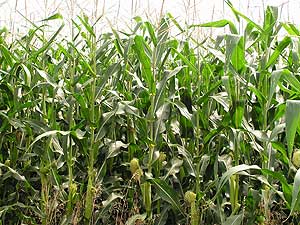|
Audio
Photos
More from MPR
Resources
|
August 5, 2005
 |
| Nearly all ethanol is distilled from corn. After being ground up, the corn's starch is heated, converted to sugar and fermented and purified into ethanol. (MPR Photo/Cara Hetland) |
Wentworth, S.D. — About 12 percent of the nation's corn crop now goes toward making ethanol. The energy bill requires an increase in ethanol production to 7.5 billion gallons a year within the next 10 years. That's nearly double the current total of about four billion gallons a year.
Standing outside a South Dakota ethanol plant, U.S. Rep. Bob Goodlatte, R-Virginia, says the energy bill ensures that ethanol is here to stay. Goodlatte, who chairs the House Agriculture Committee, joined U.S. Rep. Stephanie Herseth, D-South Dakota, on his first ever tour of an ethanol plant.
Goodlatte says at first, he was reluctant to support ethanol. But he says there are opportunities to turn things other than corn into energy.
"There's a lot of livestock production in South Dakota, and animal waste was included in this legislation as was wood waste. I have a very heavily wooded area in my district, and wood waste is also a potential source of ethanol," says Goodlatte.
"Utilizing the resources of our country, including things we now call waste, I think in the future we'll view as valuable resources is an important part of this whole process that was led by corn growers and ethanol plants," he says.
Goodlatte says he was concerned with turning so much of the nation's corn crop into fuel. He says in his Virginia district, livestock and poultry farmers have to import corn for feed. He says ethanol production drives up the price of corn.
Farmers like that. Some critics claim ethanol production uses more fuel energy to run the plant than it saves as a fuel additive. Ethanol supporters dispute that contention.
However, Rep. Stephanie Herseth says the energy bill allows ethanol supporters to think outside the box and look for even more efficient production methods. She says one idea is to use methane gas from livestock manure to power the plant.
"Thereby reducing the natural gas that's necessary. That's extraordinary technology -- engineering that's come a long way," says Herseth. "So we're hopeful the renewable fuel standards and the tax incentives now open up all these other areas, where people can go forward with a greater degree of certainty that those investments are good investments, and that they'll see a return on that, as we look at the next stage -- what the next decade will hold."
But whatever that may be, Brian Jennings of the American Coalition for Ethanol says the energy bill gets ethanol into more markets across the country.
He says the energy bill includes tax incentives for using other things like switch grass, waste products, or sugar to make ethanol.
Jennings says corn will continue to be the main source of ethanol, but he expects about 60 more plants will be constructed in the next five to 10 years. Some will be outside of the corn belt.
"Then the industry will have to follow up with a very aggressive promotional campaign, saying this is why ethanol is good for the environment, good for your automobile, good for your pocketbook, good for the country," says Jennings. "That's a job we really need to do now with the passage of this bill."
Jennings says he hopes the new plants won't compete with existing facilities. He says he also hopes the industry continues to be farmer-driven.






